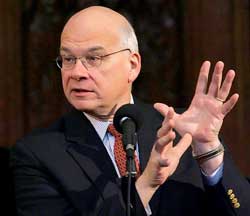Thinking caps at the ready! [3]
For all the background to this, check out Part One or Part Two...
 Continuing to ponder Tim Keller's challenge from this year's Desiring God National Conference: What is the right approach to presenting the Gospel in a post-Christian, post-modern world?
Continuing to ponder Tim Keller's challenge from this year's Desiring God National Conference: What is the right approach to presenting the Gospel in a post-Christian, post-modern world?
In this post, I'd like to throw up the framework for a 'script' that's been running through my head (in various draft forms) for the last few days.
I'm certainly not suggesting this is anything worth reading, but I think best 'out loud' and figure that I ought to be able to use my blog for that purpose. Again, the interactions that some of us have already had here have been incredibly valuable for me... I hope that they have been for you as well, and I hope they will continue!
1) The Hook - "Why is there so much evil in the world?" or "Why is there so much suffering in the world?"
One of the first challenges that pluralism/diversity presents us is to find a point of entry to conversation. I spent a lot of time trying to think what 'existential realities' are sufficiently common across all ethnic, cultural, and religious backgrounds that you could reasonably expect them to resonate with any hearer. Two things seemed the most obvious: the problem of evil and/or suffering. We all experience these things, either internally or externally.
 The classic Christian catch phrases such as "God loves you and has a wonderful plan..." or "If you died tonight, do you know where you'd go?" both assume some degree of common understand re: God, His identity/existence, etc. In such a multicultural, post-Christian culture, I'm not sure the scaffolding needed for those questions to get traction exist.
The classic Christian catch phrases such as "God loves you and has a wonderful plan..." or "If you died tonight, do you know where you'd go?" both assume some degree of common understand re: God, His identity/existence, etc. In such a multicultural, post-Christian culture, I'm not sure the scaffolding needed for those questions to get traction exist.
By pointing at evil/suffering, we really get at the root of what we live with regardless of any labels we put on ourselves. Muslims see evil and pain, as do Mormons. Even hardcore atheists who deny moral truth can't deny suffering as reality. So, why do these things we all experience exist?
Dr. Keller noted in his address that one challenge is the weaving together of story (Creation/Fall/Redemption/Restoration) and the theological elements of the Gospel (God, Christ, Sin, Grace, Faith). In the subsequent steps, I've tried - poorly, no doubt - to keep a sense of that dual reasoning... From here on out, I'll just list potential points and scripture references.
2) God created a perfect world, but it was corrupted by the entry of sin.
3) God seeks to redeem His Creation and gave us His own Son to reconcile us to Himself. Jesus lived a life of complete innocence, and yet he was put to death. Christ received the punishment for all the sins of all peoples so that the debt our sin created could be paid. Because of His perfect life and blameless death, the just penalty for our sins has been dealt with and the gulf between God and man can be bridged.
Jesus lived a life of complete innocence, and yet he was put to death. Christ received the punishment for all the sins of all peoples so that the debt our sin created could be paid. Because of His perfect life and blameless death, the just penalty for our sins has been dealt with and the gulf between God and man can be bridged.
4) We can experience restored relationship with God now and have the promise of final restoration in Heaven.
 Continuing to ponder Tim Keller's challenge from this year's Desiring God National Conference: What is the right approach to presenting the Gospel in a post-Christian, post-modern world?
Continuing to ponder Tim Keller's challenge from this year's Desiring God National Conference: What is the right approach to presenting the Gospel in a post-Christian, post-modern world?In this post, I'd like to throw up the framework for a 'script' that's been running through my head (in various draft forms) for the last few days.
I'm certainly not suggesting this is anything worth reading, but I think best 'out loud' and figure that I ought to be able to use my blog for that purpose. Again, the interactions that some of us have already had here have been incredibly valuable for me... I hope that they have been for you as well, and I hope they will continue!
1) The Hook - "Why is there so much evil in the world?" or "Why is there so much suffering in the world?"
One of the first challenges that pluralism/diversity presents us is to find a point of entry to conversation. I spent a lot of time trying to think what 'existential realities' are sufficiently common across all ethnic, cultural, and religious backgrounds that you could reasonably expect them to resonate with any hearer. Two things seemed the most obvious: the problem of evil and/or suffering. We all experience these things, either internally or externally.
 The classic Christian catch phrases such as "God loves you and has a wonderful plan..." or "If you died tonight, do you know where you'd go?" both assume some degree of common understand re: God, His identity/existence, etc. In such a multicultural, post-Christian culture, I'm not sure the scaffolding needed for those questions to get traction exist.
The classic Christian catch phrases such as "God loves you and has a wonderful plan..." or "If you died tonight, do you know where you'd go?" both assume some degree of common understand re: God, His identity/existence, etc. In such a multicultural, post-Christian culture, I'm not sure the scaffolding needed for those questions to get traction exist.By pointing at evil/suffering, we really get at the root of what we live with regardless of any labels we put on ourselves. Muslims see evil and pain, as do Mormons. Even hardcore atheists who deny moral truth can't deny suffering as reality. So, why do these things we all experience exist?
Dr. Keller noted in his address that one challenge is the weaving together of story (Creation/Fall/Redemption/Restoration) and the theological elements of the Gospel (God, Christ, Sin, Grace, Faith). In the subsequent steps, I've tried - poorly, no doubt - to keep a sense of that dual reasoning... From here on out, I'll just list potential points and scripture references.
2) God created a perfect world, but it was corrupted by the entry of sin.
- God as Creator (Genesis 1; Psalm 8; Colossians 1:16; etc)
- The perfection of Creation (Genesis 1:17, 21, 25, 28-31)
- Entry of sin (Genesis 3)
- Effect of sin (Genesis 3:14-19; Romans 1:18-32, 8:19-22)
3) God seeks to redeem His Creation and gave us His own Son to reconcile us to Himself.
- God's desire to redeem (John 3:16-20; Romans 3:21-25; 2 Peter 3:9)
- God planned redemption from the beginning (Genesis 3:15; Ephesians 1:3-6)
- Christ's work on the cross as the means of atonement (Isaiah 53; Ephesians 2:13-17; Colossians 1:15-20; Hebrews 9:11-15, 25-28)
 Jesus lived a life of complete innocence, and yet he was put to death. Christ received the punishment for all the sins of all peoples so that the debt our sin created could be paid. Because of His perfect life and blameless death, the just penalty for our sins has been dealt with and the gulf between God and man can be bridged.
Jesus lived a life of complete innocence, and yet he was put to death. Christ received the punishment for all the sins of all peoples so that the debt our sin created could be paid. Because of His perfect life and blameless death, the just penalty for our sins has been dealt with and the gulf between God and man can be bridged.4) We can experience restored relationship with God now and have the promise of final restoration in Heaven.
- Peace and restoration now (Roman 5:1-2; 8:28-39; Galatians 4:1-7; Ephesians 2:4-10; etc)
- Perfected peace and fellowship in the future (John 14:1-7; 1 Thessalonians 4:16-18; Revelation 21:1-8, 22-27)
- God is holy and all our sins are ultimately rebellion against Him (Leviticus 5:17; Psalm 51:3-6; Isaiah 6:1-5; Romans 3:23, 6:23)
- God, who sets the all the rules, orchestrated a way to bring restoration (Jeremiah 31:31-34; Hebrew 9:15)
- Jesus declared Himself to be the Son of God (Matthew 16:13-19; John 8:48-59, 10:24-33) sent into the world to sacrifice Himself for sinners (Luke 18:31-34, 22:14-20; John 8:42-47, 11:17-27)
- Jesus declared Himself to be the exclusive path to salvation (John 14:6-10), an idea which his disciples continued to teach after his death (Acts 4:8-12; Romans 3:21-22; 1 Corinthians 15:1-10)

1 Comments:
"I'm certainly not suggesting this is anything worth reading..."
You really know how to encourage your audience, huh? ;)
When people ask why God allows all this to continue, what do you say? Is God unable to stop it? Does he not care? Does he not see it? Those are questions I've been asked.
By Someone, at 12:13 PM, November 21, 2006
Someone, at 12:13 PM, November 21, 2006
Post a Comment
<< Home